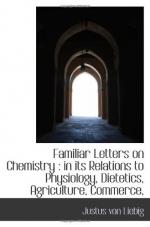Nothing then can be more certain than the fact, that an exportation of nitrogenised products does not exhaust the fertility of a country; inasmuch as it is not the soil, but the atmosphere, which furnishes its vegetation with nitrogen. It follows, consequently, that we cannot increase the fertility of our fields by a supply of nitrogenised manure, or by salts of ammonia, but rather that their produce increases or diminishes, in a direct ratio, with the supply of mineral elements capable of assimilation. The formation of the constituent elements of blood, that is, of the nitrogenised principles in our cultivated plants, depends upon the presence of inorganic matters in the soil, without which no nitrogen can be assimilated even when there is a most abundant supply. The ammonia contained in animal excrements exercises a favourable effect, inasmuch as it is accompanied by the other substances necessary to accomplish its transition into the elements of the blood. If we supply ammonia associated with all the conditions necessary to its assimilation, it ministers to the nourishment of the plants; but if this artificial supply is not given they can derive all the needed nitrogen from the atmosphere—a source, every loss from which is restored by the decomposition of the bodies of dead animals and the decay of plants. Ammonia certainly favours, and accelerates, the growth of plants in all soils, wherein all the conditions of its assimilation are united; but it is altogether without effect, as respects the production of the elements of blood where any of these conditions are wanting. We can suppose that asparagin, the active constituent of asparagus, the mucilaginous root of the marsh-mallow, the nitrogenised and sulphurous ingredients of mustard-seed, and of all cruciferous plants, may originate without the aid of the mineral elements of the soil. But if the principles of those vegetables, which serve as food, could be generated without the co-operation of the mineral elements of blood, without potash, soda, phosphate of soda, phosphate of lime, they would be useless to us and to herbivorous animals as food; they would not fulfil the purpose for which the wisdom of the Creator has destined them. In the absence of alkalies and the phosphates, no blood, no milk, no muscular fibre can be formed. Without phosphate of lime our horses, sheep and cattle, would be without bones.
In the urine and in the solid excrements of animals we carry ammonia, and, consequently, nitrogen, to our cultivated plants, and this nitrogen is accompanied by all the mineral elements of food exactly in the same proportions, in which both are contained in the plants which served as food to the animals, or what is the same, in those proportions in which both can serve as nourishment to a new generation of plants, to which both are essential.
The effect of an artificial supply of ammonia, as a source of nitrogen, is, therefore, precisely analogous to that of humus as a source of carbonic acid—it is limited to a gain of time; that is, it accelerates the development of plants. This is of great importance, and should always be taken into account in gardening, especially in the treatment of the kitchen-garden; and as much as possible, in agriculture on a large scale, where the time occupied in the growth of the plants cultivated is of importance.




